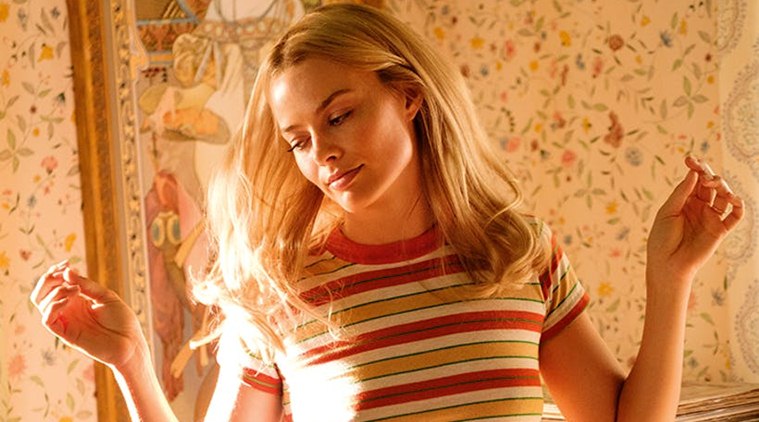
The following article contains spoilers for Once Upon a Time … in Hollywood.
At the Cannes Film Festival in May, on the night before Quentin Tarantino premiered his new film Once Upon a Time … in Hollywood, I ran into the Sony Pictures chairman Tom Rothman. Tarantino had already asked the press not to spoil any of the surprises in the sprawling film they were about to see, but Rothman couldn’t resist one little tease.
“This movie,” he told me with a significant grin, “has the greatest. Ending. Ever!”
Since the film is ostensibly building toward the gruesome, real-life murder of actress Sharon Tate (played by Margot Robbie) by the followers of the cult leader Charles Manson, Rothman’s hint of a crowd-pleasing ending was a bit of a curveball. Then again, Tarantino has always been eager to mess with the historical record if it makes for a better movie, as he did with the twist ending of “Inglourious Basterds,” where a troupe of fictional characters kills Hitler and his cabal to wrap up World War II far ahead of schedule.
So what exactly goes down at the end of Once Upon a Time … in Hollywood? And what are people making of it so far?
First, it’s important to note that while the film is set in 1969 Hollywood and features both Tate and the Manson family, it’s really more about Rick Dalton (Leonardo DiCaprio) and Cliff Booth (Brad Pitt), two ageing Hollywood players trying to hold onto what little purchase they have left in the industry. Dalton is a faded TV star who has been reduced to guest appearances and spaghetti westerns, and Booth is his loyal stuntman, whose job is becoming obsolete as Dalton’s offers dry up.
The closest these two men come to rubbing shoulders with the Hollywood A-list is on Cielo Drive, where Dalton happens to live next to director Roman Polanski (Rafal Zawierucha) and his wife, Tate. Though he has never received so much as a hello from either of them, Dalton notes that a single pool-party invitation from the director of Rosemary’s Baby could change the failing course of his career.
There are more brushes with fate still to come. The film’s final act takes place on Aug. 8, 1969, the day of the slayings, a tragedy that Tarantino appears to be hurtling toward with ominous time stamps and a sudden increase in narration. The oblivious denizens of Cielo Drive go about their business that night as Dalton gets hammered, Booth gets high, and Tate traipses around her house with three friends who also perished in the real-life murders.
Only that’s not what happens here. Manson’s acolytes do show up on Cielo Drive, led by Tex Watson (Austin Butler), but they’re sidetracked from their mission when an irate Dalton storms outside and orders them to move their car, which is belching noise and smoke. The cult members’ new plan: Instead of storming Tate’s house, Watson and his cohorts Susan Atkins (Mikey Madison) and Patricia Krenwinkel (Madisen Beaty) will break into Dalton’s home and kill whoever is there.
It doesn’t go so well for them.
In a sequence that plays like a gory remake of Home Alone, Booth’s pit bull makes a hungry beeline for Watson’s crotch, while Booth himself smashes Krenwinkel’s face into nearly anything he can find, including a telephone, a wall and the side of a fireplace. Atkins escapes to the back, where Dalton has been floating in the pool with headphones on; once he realizes what a threat the woman is, Dalton takes her out with a flamethrower from a war film he starred in.
It’s a startling sequence, not only because it rewrites history but because Tarantino takes such comic glee in staging the murders, especially when our heroes bloodily dispatch Krenwinkel and Watson. “The brutality exacted on the women is straight-up shocking,” wrote Rich Juzwiak of Jezebel, “and I say this as someone with an iron stomach for cinematic carnage.”
What will general audiences make of the ending now that the film is in wide release? That reaction likely depends on how familiar moviegoers are with the history that Tarantino is taking liberties with: Though most people know enough about World War II to understand it went down differently than Tarantino portrayed it in “Inglourious Basterds,” many younger viewers may be in for a shock when they research Sharon Tate upon returning home from “Once Upon a Time … in Hollywood,” only to discover her not-so-happy ending.
Tarantino’s ending allows Tate to live, but it does so by sidestepping her almost entirely. After the melee concludes, and Tate’s friend Jay Sebring (Emile Hirsch) comes to Tate’s front gate to ask Dalton what happened, we hear Tate herself as a disembodied voice on the intercom, beckoning Dalton to come in and join them.

It’s the invitation Dalton has been angling for, but “it also has the effect of denying Sharon Tate much of a role in a movie purportedly about the tragedy that came to signify her life,” the critic Bilge Ebiri wrote for Vulture. Whether she lives because of Rick Dalton or dies at the hands of Manson’s acolytes, Tate isn’t treated as much more than a trophy.
And while Inglourious Basterds handed its ahistorical revenge to Jewish characters, including a woman whose family had been murdered by Nazis, “Once Upon a Time … in Hollywood” allows Tate and her gentle friends no cathartic moment of fighting for their own lives and winning. Instead, that moment goes to old-fashioned manly men who might have mused, “If I were there, I could have stopped it.”
Does that make it, as Rothman teased, the greatest denouement ever? Each viewer’s mileage may vary, but there’s no denying it’s a Hollywood ending.